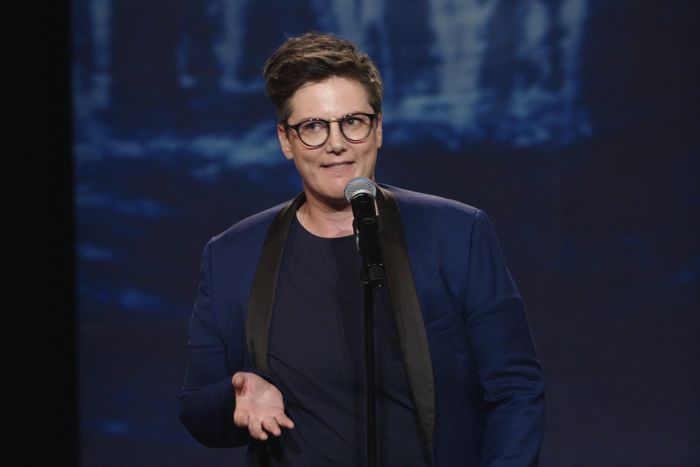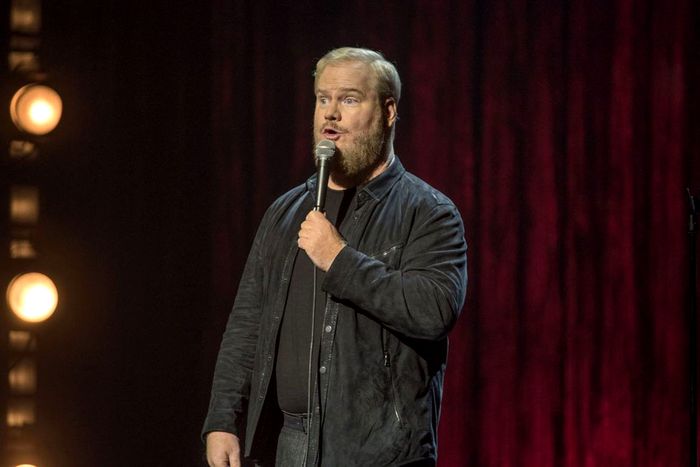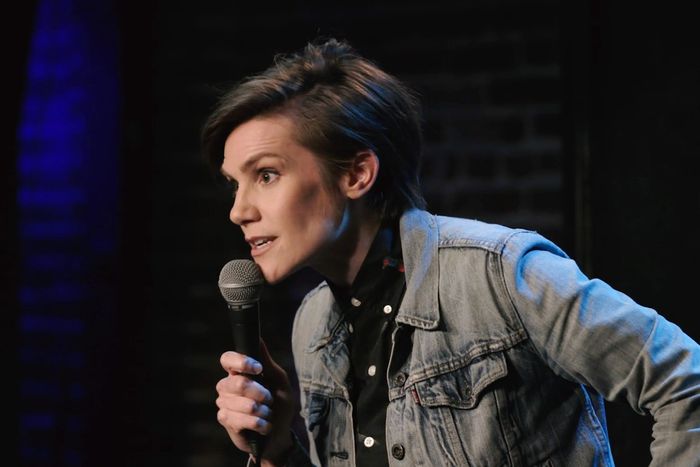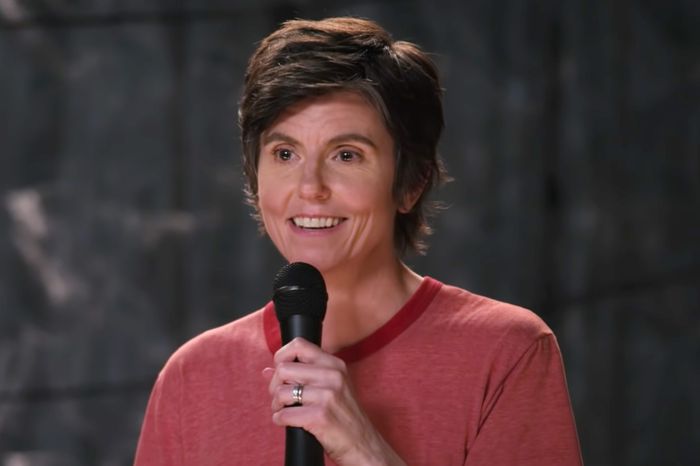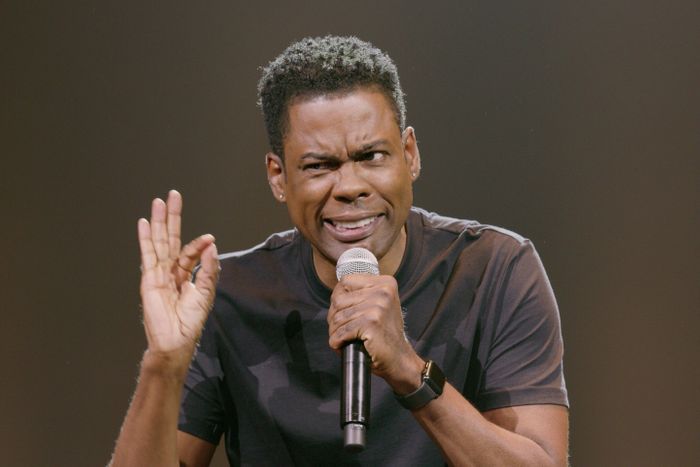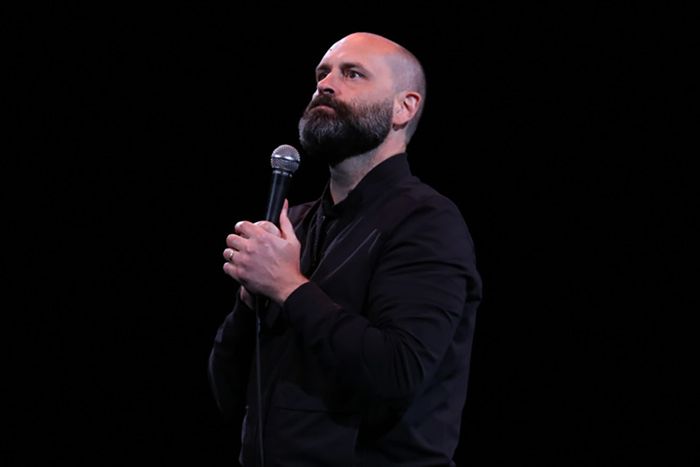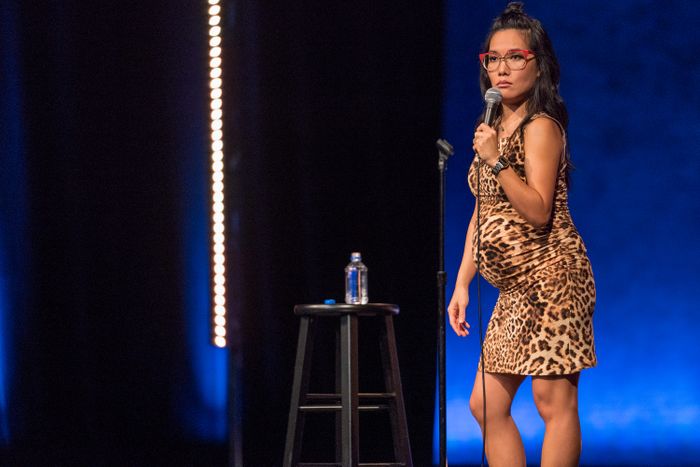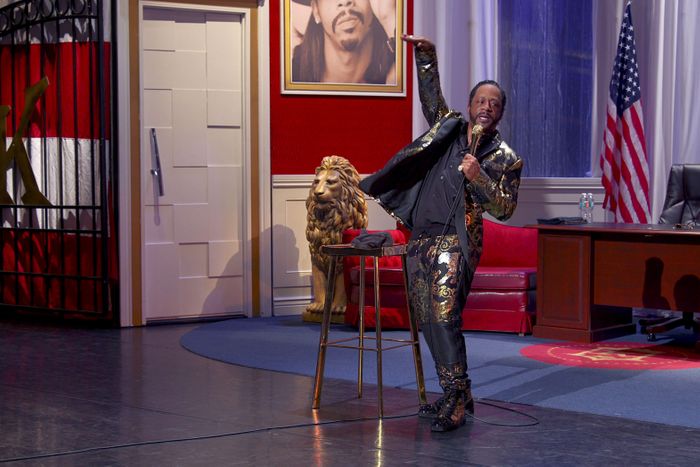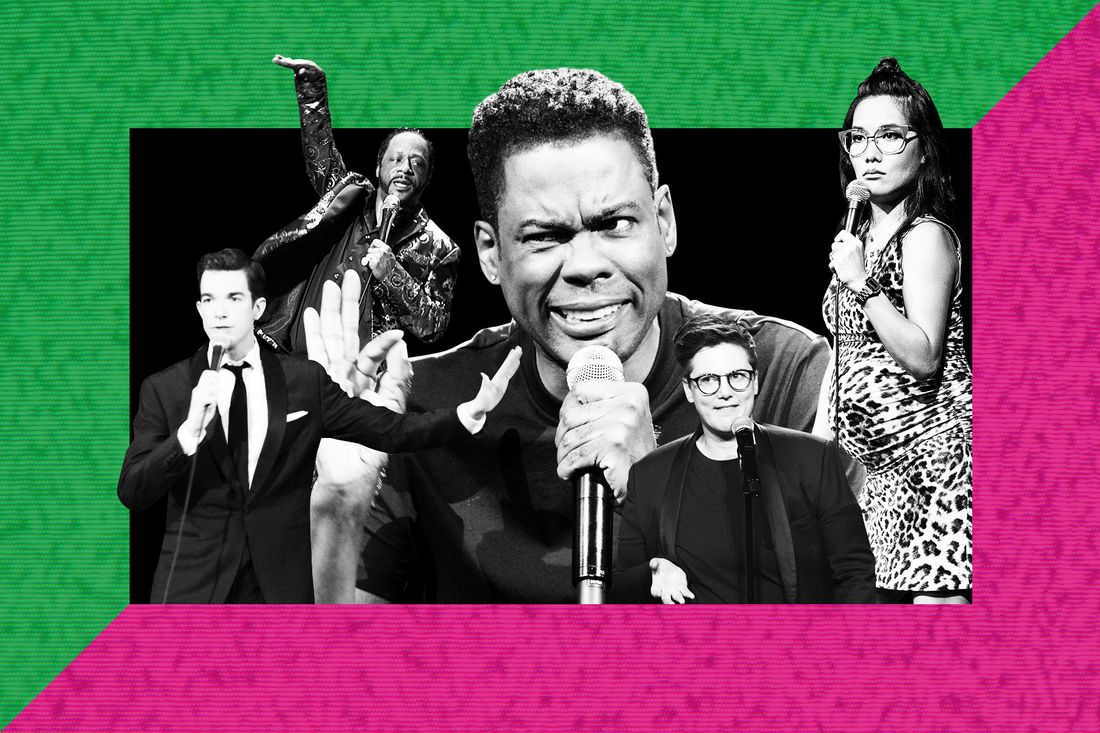
What qualifies as a stand-up special?
This question became the idée fixe that generated a surplus of hot takes and passionate debates within comedy circles in 2018. It’s a valid inquiry, as this past year saw not only the amount of comedy specials that can be released in a calendar year proliferate, but also a concerted effort to play with form, with time, and with the very nature of performance.
A weird, puritanical streak emerged when certain critics discussed what constitutes stand-up compared to, say, a one-man show, or a theater piece, or performance art. Veteran of the stage John Leguizamo repackaged his Tony-nominated solo Broadway show for Netflix, but can we call it stand-up? A lifer comic using props and impressions to tell funny jokes about the unfunny history of cultural erasure sure sounds like stand-up to me. Drew Michael went full-on Brechtian with his HBO special (directed by fellow stand-up Jerrod Carmichael), opting to perform his act to a completely empty room. Cloyingly, annoyingly avante-garde? Sure. Stand-up comedy? Absolutely. Hannah Gadsby’s Nanette was accused of being “stand-up tragedy” that bordered on being a TED Talk that railed against the psychological shortcomings of comedy. I’m not sure when stand-up was forbidden from using a unique structure to dive headfirst into pain or hyperpersonal emotional epiphanies — and it’s very suspicious that these complaints weren’t levied against, say, Neal Brennan’s 3 Mics or Mike Birbiglia’s Thank God for Jokes from last year — but for some reason, Nanette was the face that launched a thousand think pieces. I mean, did you forget that this exists?
Basically, what I’m trying to say to you overly pedantic folks arguing over the definition of stand-up comedy: Who cares? In a year that gave us remarkable, tightly composed quarter-hours from Janelle James and Sabrina Jalees on Netflix’s The Comedy Lineup; all-timer half-hours from Kyle Kinane to Aparna Nancherla, Megan Gailey to Liza Treyger; and hour-long sets — some traditional, some experimental — from newcomers and vets alike, why are we splitting hairs instead of encouraging the evolution of an art form that’s long overdue for some? Very funny people are still getting onstage and being very funny for our enjoyment. That’s all that matters. And honestly, the funniest taped comedy I saw this year wasn’t a special at all, but Lorelei Ramirez’s 14-minute fever dream of a set for Paste. While I was watching it, I kept thinking, This could easily be a special. It’s about as long as Netflix’s Comedy Lineup. It’s more captivating than most hours. I’m going to try to include this in the Best of the Year list! But in order to pare down the sheer volume of specials released this year to a tenable top ten amid all the 15- and 30- and 60-minute specials, the final criterion came down to a matter of cohesiveness, so only new hours were considered for the final selections. The coward’s way out, I admit. So please seek out the comedy sets mentioned above, and please enjoy the best hour-long specials of the year below.
10. Hannah Gadsby, Nanette (Netflix)
Nanette isn’t the first special to use comedy as a cudgel to shatter the concept of comedy itself, nor is Hannah Gadsby the first comedian to rake comedy over the coals for fortifying toxic behavioral patterns. But Nanette certainly feels the most urgent in its deconstruction, tethering the tension on which joke-telling relies to her real-life trauma, and how comedy compounded that trauma when she had convinced herself it helped her heal: “What I had done with my comedy show about coming out was, I froze an incredibly formative experience at its trauma point and I sealed it off into jokes. Then that story became a routine, and through repetition that joke version fused with my actual memory of what happened.” Gadbsy also speaks directly to an indirectly complicit audience, requiring them to reassess — and rigorously interrogate — what it is exactly they’re laughing at. Nanette manages to be comedically curative despite its heaviness, and it’s a brutally vulnerable look at how much of ourselves we can lose when we try to heal through ironic detachment.
9. Jim Gaffigan, Noble Ape (Comedy Dynamics)
Jim Gaffigan’s sixth special arrived right on the heels of last year’s Cinco, a creative departure from the Grammy-nominated comedian’s typically unhurried approach to writing and releasing new hours (three years before Cinco was 2014’s Obsessed, and two years before that was Mr. Universe). And yet nothing feels rushed or half-assed about Noble Ape; in fact, quite the opposite rings true. Ape is as confessional and deeply personal as Gaffigan has ever been. Sure, he’s still the same silly, self-effacing, clean performer you’ve come to know and love, but it’s no coincidence that the special — which was directed and co-written by his wife, Jeannie — briefly flirts with tragedy in a way that the jovially-toned comic never has. This is because Jeannie herself was diagnosed with a brain tumor last year, and Jim confronts it head-on at the top of his act (the tumor, thankfully, was successfully removed after a grueling nine-hour operation). And while Gaffigan does release the vulnerability valve, he never resorts to melodrama, opting instead to use his trademark self-deprecating jokes to both suture his emotional wounds (a great bit about the doctor sticking with food shapes to describe the tumor) and to celebrate Jeannie’s bravery (“I didn’t remove it. I was in another room soiling myself”).
8. Cameron Esposito, Rape Jokes (Self-Released)
Successfully deconstructing a joke that was never funny to begin with is no mean feat. A survivor of sexual assault herself, Esposito isn’t necessarily reclaiming the toothless, unfunny trope of toothless, unfunny men using rape as fodder for their act so much as she’s using this hour to expertly mete out comedic justice for survivors — especially as the trades and papers of note trip over themselves to forgive comedy’s sex pest after mere months of minimal penalty. It’s inspiring to watch Esposito bravely and hilariously shut all that noise down, and it’s heartbreaking that she even had to. Esposito uses Rape Jokes to speak to the UCB Theater crowd in her disarmingly warm and relaxed style, anatomizing the rape joke itself, mocking the behavior of the self-proclaimed Good Ally™, and even poking fun at herself in the process. To squirm at the title of the special is both the point and the problem.
7. Tig Notaro, Happy to Be Here (Netflix)
There’s an unbridled silliness coursing through the confessional veins of Happy to Be Here. Not that Tig Notaro’s sensibility was ever self-serious, but occasionally her material would maneuver toward the melancholy, as she often spoke candidly about her experience with breast cancer, her double mastectomy, and the death of her mother, all while managing to excavate the humor out of these very unfunny topics. But Happy finds Tig making lemonade from life’s lemons and reveling in the things for which she’s grateful — things that are ripe for comedic observation, like motherhood, marriage, and that she’s still being invited to stuffy parties even though she can’t help but pull pranks on the attending guests. It’s the latter observation that inspires a metacloser for the books, which is an 11-minute bit that’s 10 minutes of setup: “Are the Indigo Girls coming out to perform or not?” The punch line is worth the wait.
6. Chris Rock, Tamborine (Netflix)
Swapping out the slick suits and stadium-status crowd size for a plain black T-shirt and the close quarters of the BAM Theater, Chris Rock’s first special since 2008’s Kill the Messenger finds the veteran comic at his most vulnerable and confessional. Rock airs out his dirty-laundry list of self-facilitated fuck-ups that lead to his recent divorce — his infidelity, porn addiction, and fragile ego — with unflinching yet hilarious detail. Director Bo Burnham shows restraint behind camera, forgoing classical sweeping jib shots and letting us feel the intimacy of the space with tightly framed close-ups the rawer Rock’s act gets. And while Rock ultimately (and frustratingly) retreats back to his trademark male chauvinist cop-outs when it comes time to face the music, Tamborine is the closest he’s tiptoed toward remorse and accountability for his offstage behavior, behavior that has informed his onstage material for all these years. It’s like watching a self-inflicted wound begin to heal in real time.
5. Ted Alexandro, Senior Class of Earth (All Things Comedy)
Ted Alexandro has had a busy year. First, he went viral in a clip from a Comedy Cellar set earlier this year where Alexandro, a former opener for Louis C.K., righteously called out the institutions and gatekeepers that continue to protect abusers in comedy like C.K. Now there’s Senior Class of Earth, Alexandro’s proper hour-long special distributed by Al Madrigal and Bill Burr’s company All Things Comedy. Class finds Alexandro monopolizing every inch of the intimate New York club, his commanding tone, deliberate pacing, and unruffled rhythm on full display. There are moments that feel excitingly extemporaneous and slightly unpolished, like this is a road gig for a hardened club comic (a great bit about a police encounter that “thrust him into a commercial for white privilege” comes to mind). Then Alexandro will slip comfortably in the pocket, casually controlling the room like he’s the host of a cocktail party among friends, using an elaborate Shaq-on-the-Celtics analogy to detail the realities of his dwindling libido. But the special really sings when he wades into political waters. Many comics splash their dives when talking about the horrors of the Trump era because they often conflate “satire” with “softening the blow.” But Alexandro offers an unflinching honesty about the naked bigotry undergirding the president’s platform (“I’m not saying everyone who voted for Trump is racist. I’m saying my grandparents were. And if you voted for Trump, you probably would’ve liked them”) and the dehumanizing nature of late capitalism with a matter-of-fact manner that even the pundit class shies away from.
4. Ali Wong, Hard Knock Wife (Netflix)
If the tension from giving birth to her first child undergirded Baby Cobra — Ali Wong’s star-making 2016 stand-up special, which she performed during her third trimester — then the anxiety of being a successful working mother as she prepares to bring her second child into the world informs the funny within Wong’s follow-up, Hard Knock Wife. Wong’s inspired raunchiness is still on display in her sophomore effort, with unflinching descriptions of baby bodily fluids and a top-notch physical performance of reenacting the (lack of) oral sex from her high-school years. But it’s Ali’s middle finger at the sexist double standards for parenting, America’s failure to provide dignified maternity leave, and her delightfully dark spins on domesticity (“I’m on the verge of putting her in the garbage”) that are worth the price of admission alone.
3. Katt Williams, Great America (Netflix)
Much has rightfully been said about Williams’s rousing geographically oriented opening bit, but Great America’s whole is absolutely greater than the sum of its parts. Great America feels like a throwback to The Pimp Chronicles, Pt. 1–era Williams, with the compact comedian completely reanimated and larger than life as he commands every inch of the Florida Theatre stage with his signature physical work (seriously, the guy uses his stool like a paintbrush on a canvas) and rapid-fire line-them-up-and-knock-them-down joke-telling. Williams’s charismatic style, which is a healthy balance of braggadocio and self-deprecation, carries him through otherwise well-trodden material, from Trump to relationships, and his takes manage to feel fresh and fully alive. Great America is just a wonderfully consistent hour.
2. Adam Sandler, 100% Fresh (Netflix)
Nostalgia has been wielded in a weird, cheap way in pop culture as of late. You know all those shows and movies that think if they clutter the frame with decade-specific cultural signifiers and treating them as insignias to wear instead of textures to feel, then that will count as a point of view? That cynical “Hey, remember that thing you liked when you were a kid? Well, here it is … AGAIN!” business model is very bankable, no doubt, but boy is it hollow and uninspiring. Ironically enough, Adam Sandler — a comedic performer often accused (and occasionally rightfully so) of resting on the laurels of his adolescent humor — bucks this tired trend with 100% Fresh, his first hour-long special in over 22 years. Sandler doesn’t necessarily forgo his signature juvenilia so much as he repackages it as self-aware anti-comedy, acknowledging that he is too old to be making these jokes and that we the audience are too old to be still laughing at them. And yet we still do, and that creates a comically cathartic atmosphere, performer and audience both giving each other permission to feel like 14-year-olds listening to They’re All Gonna Laugh at You! again, for one hour only. But 100% isn’t just an exercise in crudeness or bathroom humor, as Sandler stretches his musical-comedy muscles with beautifully rendered, moving anthems (“Bar Mitzvah Boy”; “Chris Farley”), while director Steven Brill (with the help of Paul Thomas Anderson) gives a behind-the-scenes glimpse at all the frenetic energy and labor that goes into creating a special. Sandler hasn’t always swayed far from his tried-and-true time signature, but 100% Fresh is proof that he’s still got plenty of hits left in the chamber after all these years.
1. John Mulaney, Kid Gorgeous at Radio City (Netflix)
“He looked like he should be the conductor on a locomotive powered by confetti. But instead … he made his living in murder.” That’s John Mulaney, roughly four minutes into his ten-minute, diligently rendered description of the real-life former Chicago police detective J.J. Bittenbinder, who used to haunt the student assemblies of his elementary-school years with disturbing tales of violence all in the name of child safety. And it’s that farcical pop of character color that highlights what makes Mulaney one of the most entertaining writers and performers of this generation: the obsession with detail, the cartoonish command of the English language, and the precision with which he can execute a perfectly punchy turn of phrase. The economy and specificity of his writing gives conventional observations — whether on family, marriage, or Trump being like a horse let loose in a hospital — a refreshing shade of absurdity. There’s also a polish to his act that makes every breath, pause, and syllable feel as if they’ve been belabored over on an elemental level. But Mulaney’s gift is his ability to avoid being mechanical or stiff, as his showmanship and modulated mischievousness add an intoxicating layer of looseness to his set. The guy is just infuriatingly good.


